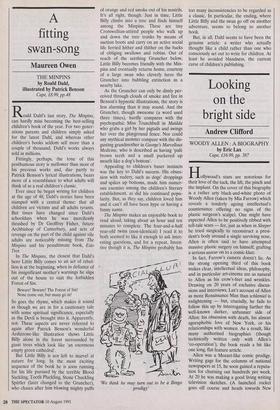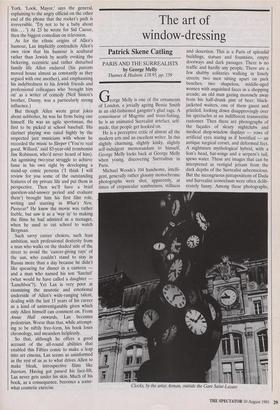Looking on the bright side
Andrew Clifford
WOODY ALLEN : A BIOGRAPHY by Eric Lax Cape, £16.99, pp. 387 Hollywood's stars are notorious for their love of the tuck, the lift, the pinch and the implant. On the cover of this biography is a rather arty black-and-white photo of Woody Allen (taken by Mia Farrow) which reveals a tenderly ageing intellectual's countenance offering no signs of the plastic surgeon's scalpel. One might have expected Allen to be positively ribbed with tell-tale scars — for, just as when in Sleeper he tried surgically to reconstruct a presi- dent's body around a single surviving nose, Allen is often said to have attempted massive plastic surgery on himself, grafting a serious auteur on to a comic klutz.
In fact, Farrow's camera doesn't lie. As the strong opening third of this book makes clear, intellectual ideas, philosophy, and in particular art-cinema are as natural to Allen as his crow's-feet and wrinkles. Drawing on 20 years of exclusive discus- sions and interviews, Lax's account of Allen as more Renaissance Man than schlemiel is enlightening — but, crucially, he fails to follow this up by interrogating further the well-known darker, unfunnier side of Allen: his obsession with death, his almost agoraphobic love of New York, or his relationships with women. As a result, like many authorised biographies (though technically written only with Allen's `co-operation'), the book reads a bit like one long, flat feature article.
Allen was a Mozart-like comic prodigy. Writing gags for the columns of national newspapers at 15, he soon gained a reputa- tion for churning out hundreds per week. At 20 he was making a good living writing television sketches. (A launched rocket goes off course and heads towards New
York. 'Look, Mayor,' says the general, explaining to the angry official on the other end of the phone that the rocket's path is irreversible. 'Try not to be a baby about this... ') At 23 he wrote for Sid Caesar, then the biggest comedian on television.
As for the ethnic origins of Allen's humour, Lax implicitly contradicts Allen's own view that his humour is acultural rather than Jewish by neatly evoking the bickering, eccentric and rather disturbed family life Allen endured (his parents moved house almost as constantly as they argued with one another), and emphasising his indebtedness to his Jewish friends and professional colleagues who 'brought him on' as a writer of comedy (Neil Simon's brother, Danny, was a particularly strong influence.)
But though Allen wrote great jokes about nebbishes, he was far from being one himself. He was an agile sportsman, the first to be picked at school baseball. His clarinet playing was rated highly by the respected jazz musicians with whom he recorded the music to Sleeper (`You're real good, Willard,' said 83-year-old trombonist Jim Robinson, who'd never heard of him). An agonising two-year struggle to achieve fame in his own right by developing a stand-up comic persona CI think I will review for you some of the outstanding features of my private life and put them in perspective. Then we'll have a brief question-and-answer period and evaluate them') brought him his first film role, writing and starring in What's New, Pussycat? He knew the movie was rather feeble, but saw it as a 'way in' to making the films he had admired as a teenager, when he used to cut school to watch Bergman.
Such savvy career choices, such lean ambition, such professional dexterity from a man who walks on the shaded side of the street to avoid the 'cancer-giving rays' of the sun, who couldn't stand to stay in Russia more than a day because he didn't like queueing for dinner in a canteen and a man who named his son 'Satchel' (what would he have called a daughter — `Lunchbox'7). Yet Lax is very poor at examining the neurotic and emotional underside of Allen's wide-ranging talent, dealing with the last 15 years of his career as a kind of uninvestigatable given which only Allen himself can comment on. From Annie Hall onwards, Lax becomes pedestrian. Worse than that, while attempt- ing to be niftily free-form, his book loses chronology, and meanders helplessly. So that, although he offers a good account of the all-round abilities that enabled this Fifties comic to make a leap into art cinema, Lax seems as uninformed as the rest of us as to what drives Allen to make bleak, introspective films like Interiors. Having got passed his face-lift, Lax never gets under his skin. Much of his book, as a consequence, becomes a some- what cosmetic exercise.



















































 Previous page
Previous page